Commentary on Luke 1:14
Verse Context: In the Gospel of Luke, particularly in chapter 1, we witness the announcement of the miraculous birth of John the Baptist. This declaration is made to Zechariah, a priest, while he is performing his duties in the temple.
Luke 1:14 (KJV): "And thou shalt have joy and gladness; and many shall rejoice at his birth."
Exegesis and Theological Insights
This verse speaks about the joy that will accompany the birth of John the Baptist. It foreshadows not just the joy for Zechariah and Elizabeth but also emphasizes the wider significance of John's role in the redemptive history.
1. Joy and Gladness
Matthew Henry notes that joy is a fruit of the Spirit (Galatians 5:22) and suggests that the announcement serves as a precursor to the great joy that follows in the incarnation of Jesus. This joy is not limited to personal feelings but extends to a communal experience of rejoicing.
According to Albert Barnes, this joy can be attributed to the divine intervention in the life of Zechariah and Elizabeth—they, being advanced in age and childless, would find unimaginable joy in the birth of their son. Their case exemplifies God's ability to bring hope into seemingly hopeless situations.
2. The Impact of John's Birth
The text continues by emphasizing that "many shall rejoice" at John’s birth. Adam Clarke remarks that John's role as the forerunner of Christ is significant. Many, particularly those who would later follow Jesus, would recognize the importance of John's ministry and rejoice at his arrival. Hence, this joy is multifaceted; it includes personal, familial, and communal aspects.
Furthermore, as Matthew Henry points out, John's birth not only signifies joy for his family but also heralds the coming of the Messiah, which would bring joy to the entire world. This theme of joy resonates throughout the Gospel narrative, culminating in the joy of the resurrection.
Historical and Cultural Context
Albert Barnes places the narrative within the framework of Jewish customs of the time. In ancient Israel, having children was a sign of God's blessing. Zechariah and Elizabeth's long wait for a child would have been a source of sorrow and stigma in their culture. Thus, the announcement of a child brings immense relief and joy, not only to them but to their community, as it reaffirms God's providential care.
The Role of Angels in Joyful Announcements
The appearance of an angel with this proclamation underscores the divine origin of the message. Adam Clarke observes that angels are often messengers of joy in Scripture; their proclamations frequently herald significant moments in redemptive history. This aspect adds a layer of gravitas to the message of John’s birth.
Theological Themes
- Divine Sovereignty: This verse highlights God's direct intervention in human affairs. God's plan will come to fruition regardless of human limitations.
- Hope and Expectation: Zechariah and Elizabeth, despite being advanced in age, are given a promise that invokes hope. This reinforces the biblical theme that God brings life and joy out of barrenness and despair.
- Community Impact: The joy mentioned is not isolated; it encompasses a broader community rejoicing over God’s blessing. This illustrates the interconnectedness of joy in the Christian faith.
Practical Applications
This verse serves as a powerful reminder for pastors and theologians to articulate messages of hope and joy in their ministries. In a world often marked by despair, the biblical narrative continues to affirm that God’s actions bring profound joy that transcends individual experiences.
Matthew Henry encourages believers to recognize that their experiences of joy may come through unexpected means, much like Zechariah and Elizabeth’s situation. It challenges the Church to cultivate an environment where shared joy can flourish.
Conclusion
Luke 1:14 encapsulates a moment of divine revelation that brings joy not only to Zechariah and Elizabeth but also to many others. By drawing insights from early commentators like Matthew Henry, Albert Barnes, and Adam Clarke, we recognize the multifaceted nature of joy within the Christian narrative and the significance of John the Baptist’s coming as part of God’s redemptive plan. This verse is a reminder that God’s promises bring hope and joy, extending beyond individual hearts to communities and the world.


